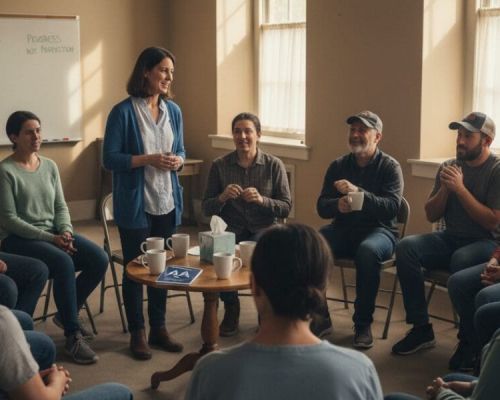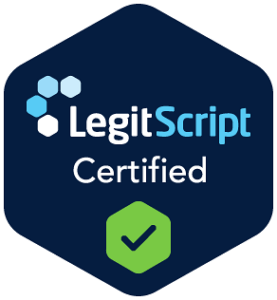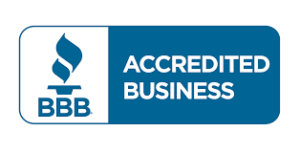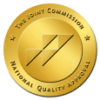Opiate and opioid addiction has touched families and communities all across Tennessee. For many people, it starts with a prescription after surgery or an injury. For others, it begins with trying to numb stress, trauma, or emotional pain.
However it started for you or your loved one, living with opioid addiction can feel exhausting, isolating, and frightening especially when you’ve tried to cut back or quit and just can’t stay off on your own. That’s where a structured opiate rehab in Tennessee can make a real difference.
Tennessee Detox Center offers a comprehensive Tennessee opioid rehab program designed to keep clients safe during withdrawal and help them build a genuine path forward in recovery.
Whether someone needs medical detox, inpatient opiate rehab in Tennessee, or step-down options like partial hospitalization and intensive outpatient opiate rehab, treatment is tailored to the individual, not the other way around.
This page walks you through how opiate and opioid addiction work, what puts people at risk, and how a dedicated opiate rehab center in Tennessee helps you start again with real support.
Understanding Opiate Addiction
People often use the words “opiates” and “opioids” interchangeably, but there is a technical difference. [1]
- Opiates are natural substances derived from the opium poppy, like morphine, codeine, and heroin.
- Opioids is a broader term that includes opiates and man-made or semi-synthetic drugs such as oxycodone, hydrocodone, hydromorphone, fentanyl, and many prescription pain medications.
In everyday language and even in many medical settings these terms blur together. What matters most for treatment is that all of these drugs act on the same receptors in the brain and body, carry a high risk of dependence, and can lead to life-threatening overdose.
Whether someone is misusing heroin, fentanyl, or pain pills, an opioid rehab in Tennessee or opiate rehab Tennessee program addresses the same core problem: a powerful addiction that doesn’t respond to willpower alone.
Addiction vs Physical Dependence
Another common source of confusion is the difference between addiction and dependence.[2]
- Physical dependence means the body has adapted to the presence of a drug. If you stop suddenly, you experience withdrawal symptoms like chills, sweating, nausea, muscle aches, anxiety, or insomnia. Dependence can develop even when someone takes opioid medications exactly as prescribed over time.
- Addiction (often diagnosed as opioid use disorder) goes beyond dependence. Addiction involves compulsive use, cravings, loss of control, and continuing to use despite serious consequences at home, work, school, or with health and finances.
Someone can be physically dependent on prescribed opioids without meeting criteria for addiction. At the same time, addiction almost always includes some degree of physical dependence.
A high-quality opioid addiction rehab in Tennessee looks at both sides: the physical dependence that requires safe detox and the behavioral, emotional, and psychological patterns that keep someone stuck in the cycle of using.

How Opiate and Opioid Addiction Affect the Brain and Body
Opiates and opioids latch onto the parts of your brain and nervous system that control pain and reward. [3] In the beginning, they can make you feel relaxed, comfortable, or even euphoric. But the brain adjusts quickly. The same amount that once worked stops having the same effect, so people start taking higher doses or using more often. That’s tolerance.
As tolerance grows, the body becomes dependent on having opioids in its system just to feel “normal.”
When the drug level drops, withdrawal hits, and it can be overwhelming. At that point, many people aren’t using to feel good. They’re using to keep withdrawal and emotional distress away. This is why quitting on your own can feel impossible and why relapse happens so often without real support.
In a Tennessee opiate rehab program, clinicians understand how opioid addiction rewires the brain. It affects decision-making, stress, motivation, and even basic daily functioning. Treatment works to stabilize the body, calm the nervous system, build healthier coping skills, and help you rebuild a life that’s not controlled by the next dose.
Risk Factors for Opiate Addiction
For many people, opioid addiction doesn’t start on the street. It starts in a doctor’s office or after an injury. Some of the biggest risk factors include: [4]
- Staying on opioid prescriptions for a long time to manage chronic pain
- Being given high doses or frequent refills without close follow-up
- Taking medication more often than prescribed or “doubling up” when pain flares
- Using opioids alongside other sedating medications like benzodiazepines, sleep aids, or muscle relaxers
- Not having a taper plan or any non-opioid options for managing pain
When someone is in real pain and opioids offer fast relief, the shift from short-term use to long-term dependence can happen quietly.
Without good guidance, it’s easy to slip into misuse like taking extra pills, using medication that wasn’t prescribed, or mixing opioids with alcohol or other substances to feel more relief.
These patterns can quickly increase the chances of needing opiate addiction rehab in Tennessee or opioid treatment Tennessee down the road.
Personal history and family background also play a major role. Risk factors can include:
- A family history of substance use disorders, alcohol misuse, or mental health conditions
- A personal history of anxiety, depression, PTSD, or other mental health issues
- Childhood trauma, neglect, or exposure to violence
- Early exposure to substances during teenage years or young adulthood
- High levels of stress with few healthy coping tools
None of these factors guarantee that someone will develop an opioid addiction, but they make it more likely that opioids will feel especially “relieving” emotionally as well as physically. That can set the stage for misuse, escalation, and eventually the need for structured care at an opioid rehab center in Tennessee or opiate treatment Tennessee program.
Where someone lives and works can play a big role in how opioid addiction develops. In many rural parts of Tennessee, people don’t have easy access to non-opioid pain care, mental health services, or affordable therapy.
Others work in demanding jobs like construction, manufacturing, healthcare, or first responder fields where injuries, stress, and burnout are common.
Economic pressure, unstable housing, or being surrounded by social circles where pill use or heroin is normal can also push someone toward misuse. At the same time, shame and stigma make it hard to speak up or ask for help until things are already spiraling.
Opioid addiction doesn’t target one type of person. It shows up across all ages, communities, and income levels. The hopeful part is that recovery is real and possible with the right opiate rehab center Tennessee or the best opioid addiction treatment Tennessee.
Understanding your risk factors isn’t about blame. It’s about getting the kind of support that meets you where you are so you don’t have to keep fighting this alone.
Why Opiate Rehab in Tennessee Is So Important
Most people with an opioid problem have already tried to quit on their own. You cut back, flush pills, switch from one drug to another, or try to “tough it out” at home. It usually works for a day or two, then withdrawal hits.
Chills, stomach cramps, anxiety, restless legs, insomnia, and intense cravings can make it feel impossible to get through a full detox without using again. On top of that, life is still happening. You may be dealing with work, kids, money stress, legal trouble, or relationship fallout. When everything hits at once, willpower is not enough.
A structured opiate rehab in Tennessee is not about weakness. It’s about giving your brain and body the medical support, structure, and time they need to stabilize so you can actually follow through on the decision you already made: to stop letting opioids run your life.
How a Structured Tennessee Opioid Rehab Program Saves Lives
Opioid addiction is not just painful. It can be lethal. After a period of cutting back or stopping, your tolerance drops. If you relapse and take the same amount you used before, your overdose risk goes up sharply. That is one reason professional opioid treatment Tennessee is so important.
In a supervised setting like Tennessee Detox Center, you are not trying to manage withdrawal and cravings alone.
Medical staff monitor your symptoms, adjust medications, and watch for complications. Therapists and support staff help you start untangling the emotional and behavioral patterns that keep pulling you back into use.
A quality Tennessee opioid rehab program also plans for what comes after detox. That means talking about pain management, mental health, relapse prevention, and long-term support so you’re not just white-knuckling it after discharge.
Why Getting Help Close to Home Matters
There is nothing wrong with traveling for care if that is what you want. But for many people, staying in-state for opiate rehab Tennessee has real advantages:
- Family and loved ones can participate in therapy and education
- It is easier to coordinate work leave, childcare, and other responsibilities
- Stepping down from residential opiate rehab Tennessee into outpatient care and local support groups is more straightforward.
When you choose a local opiate rehab center Tennessee, you are not only getting help to get through withdrawal. You are building a recovery plan that actually fits your real life in Tennessee, with real-world supports you can continue to use after you leave treatment.
When to Seek Opiate Rehab in Tennessee
There is rarely one single moment when you “qualify” for help. Instead, there are patterns and warning signs that add up. It may be time to look at opiate treatment Tennessee or an opioid rehab center in Tennessee if you notice:
You’re taking more pills or larger doses than prescribed
You run out of medication early and need early refills
You borrow, buy, or steal opioids that are not prescribed to you
You have switched from prescription pills to heroin, fentanyl, or pressed pills
You feel sick, shaky, or anxious between doses and need opioids just to feel “normal.”
You have tried to cut back or quit several times, and keep going back to using
If you see yourself in this list, it doesn’t mean you’re a bad person. It means your nervous system has been hijacked by a powerful drug, and you deserve real help.
Red Flags That Call for Immediate Help
Some situations are too risky to ignore. You should reach out to a Tennessee opiate rehab program or another medical provider right away if:
- You have overdosed in the past or needed Narcan
- You mix opioids with alcohol, benzodiazepines, or other sedating drugs
- You have severe depression, suicidal thoughts, or feel like you don’t care if you wake up
- You have medical problems that are getting worse because of use
- Your children, partner, or employer are telling you they are scared for you
These are not signs that you are beyond help. They are signs that you should not keep trying to manage this alone. The sooner you connect with opiate addiction rehab in Tennessee or opioid addiction rehab in Tennessee, the more options you have and the safer the process can be.
How to Start the Process at a Tennessee Opiate Rehab Program
Reaching out to a rehab center can feel intimidating, especially if you are worried about judgment, cost, or legal trouble. At Tennessee Detox Center, admissions is focused on practical help, not shaming.
When you call, you can expect:
- A brief, confidential conversation about what you are using, how much, and how often
- Questions about your medical history, mental health, and any past treatment
- An explanation of recommended next steps, such as medical detox, inpatient opiate rehab in Tennessee, or a referral for outpatient care
- Help verifying insurance benefits and talking through payment options
You do not need to have the “perfect story” or know exactly what level of care you need. That is our job. Your job is simply to take that first step and be as honest as you can so we can match you with the safest, most effective opiate rehab in Tennessee for your situation.
Therapies Used in Opiate Rehab in Tennessee

Individual Therapy for Opiate Addiction
Detox and medication can get your body out of crisis, but therapy is where you start to understand how opioids became part of your life. In one-on-one sessions, you have a private space to talk about things like:
- How your addiction slowly developed
- Stress, trauma, or loss that may have pushed you toward using
- Guilt, shame, or anger that make it tough to reach out for help
- Worries about pain, work, parenting, relationships, or legal problems
Therapists often use evidence-based approaches like Cognitive Behavioral Therapy and Dialectical Behavior Therapy. These help you notice the thoughts and reactions that trigger cravings or relapse. As you build new skills, you learn how to manage stress, pain, and emotions without turning to opioids.
This is why the best opioid addiction treatment Tennessee offers doesn’t rely on medication alone. Strong, consistent individual therapy is a core part of long-term recovery.

Group Therapy and Peer Support
Addiction thrives in isolation. Group therapy helps break that pattern. In a Tennessee opioid rehab program, you are surrounded by people who understand what withdrawal, relapse, and starting over actually feel like.
Group therapy can include:
- Psychoeducation groups that teach you about addiction, the brain, and recovery skills
- Skills groups that focus on coping tools, communication, and emotional regulation
- Process groups where you share experiences, listen to others, and get feedback in a safe setting
Hearing other people from across Tennessee talk about their own struggles with heroin, fentanyl, or pain pills can be a turning point. You realize you’re not alone and you see that change is possible. This kind of peer connection is a core piece of care in many opiate rehab center Tennessee and opioid rehab Tennessee programs.

Family Therapy and Support for Loved Ones
Opiate and opioid addiction never impact just one person. Parents, partners, kids, and siblings often carry their own fear, confusion, anger, and exhaustion. Without support, home can stay tense and unpredictable, which makes long-term recovery much harder.
Family therapy and family counseling addiction Tennessee services are meant to help everyone get on the same page. These sessions can:
- Teach loved ones what addiction actually is and how it affects behavior
- Break old patterns like enabling, rescuing, or constant arguing
- Improve communication, boundaries, and daily expectations
- Prepare the whole family for what early recovery will look like after rehab
When it makes sense clinically, Tennessee Detox Center may bring family members into education sessions or therapeutic conversations as part of their Tennessee opiate rehab program. The goal is never to point fingers. It’s to help everyone understand what recovery takes and how to support it in a healthier, more stable way.

Holistic and Supportive Services
Effective opiate rehab in Tennessee does more than just remove substances. It helps you rebuild your life from multiple angles. Alongside individual and group therapy, programs may offer supportive services such as:
- Mindfulness, grounding, and relaxation exercises to calm the nervous system
- Basic movement or fitness activities appropriate for your health and mobility
- Nutrition guidance to support healing after long periods of poor eating and sleep
- Education about sleep hygiene, stress management, and healthy routines
These pieces might seem small compared to detox or medication, but they add up. When you leave residential opiate rehab in Tennessee or step down into outpatient care, it is these day-to-day skills and routines that help you stay grounded and reduce the pull of old habits.
Together, individual therapy, group work, family involvement, and holistic supports form the backbone of care in the best opiate rehab centers in Tennessee. They turn rehab from a short break from using into the start of a different way of living.

Medication-Assisted Treatment (MAT) for Opiate Rehab
Medication-Assisted Treatment (MAT) is one of the most effective tools we have for treating opioid use disorder. [5] It combines carefully prescribed medications with counseling and behavioral therapies.
The goal is not just to “replace” one drug with another. The goal is to stabilize the brain and body so you’re not fighting crippling cravings and withdrawal every minute of the day.
For many people in opiate rehab in Tennessee, MAT:
- Reduces cravings and obsessive thoughts about using
- Eases withdrawal symptoms so you can focus on therapy
- Lowers the risk of overdose and death
- Supports long-term recovery when used with counseling and support
MAT is backed by decades of research and is recommended by leading national health agencies for opioid addiction. In a high-quality opioid rehab Tennessee program, medication is used as a clinical tool, not a shortcut. You’re still doing the work of recovery in therapy, groups, and daily life.
The medication simply gives your nervous system a chance to calm down so that work is actually possible.

Common Medications Used in Opioid Treatment in Tennessee
Specific medications are chosen on a case-by-case basis after a full medical assessment. In general, MAT for opioid use disorder may include: [6]
- Medications that partially activate opioid receptors to reduce cravings and withdrawal
- Medications that fully activate receptors but are administered in controlled settings for stabilization
- Medications that block opioid receptors, so you do not feel the effects of opioids if you use
Each approach has its own benefits and considerations. The right choice depends on your history, current health, goals, and any other medications you are taking.
At Tennessee Detox Center, MAT is never one-size-fits-all. A provider looks at your full clinical picture, discusses options with you, and adjusts your plan as your body and brain begin to stabilize. That is what makes MAT an important component of many Tennessee opioid rehab programs, especially for people with a long history of heavy use or repeated relapses.
MAT as Part of a Complete Tennessee Opiate Rehab Program
Medication alone is not enough. The best opioid addiction treatment in Tennessee always pairs MAT with:
- Individual therapy to work on thoughts, beliefs, and emotional patterns
- Group therapy and peer support to reduce isolation and build accountability
- Family education and, when appropriate, family therapy
- Relapse prevention planning and aftercare
Some clients use MAT short-term, during and just after detox. Others benefit from longer-term medication support. In every case, the goal is the same: to help you build a steady, sustainable recovery where your life is bigger than your addiction.
MAT in an opiate rehab center in Tennessee is one option among many. You and your treatment team decide together if it belongs in your plan.
Inpatient vs Outpatient Opiate Rehab in Tennessee
Inpatient opiate rehab Tennessee, sometimes called residential rehab, means you live at the facility for a period of time. This level of care is structured and intensive, designed to remove you from the triggers and chaos of everyday life while you stabilize.
In a residential Tennessee opiate rehab program, you can expect:
- 24/7 supervision and support
- A daily schedule of therapy, groups, education, and recovery activities
- Regular check-ins with medical and clinical staff
- A safe, substance-free environment where you can focus on healing
Inpatient or residential opiate rehab in Tennessee is often recommended if you:
- Have a long history of opioid addiction or high daily use
- Have had multiple overdoses or serious health complications
- Live in an unstable or unsafe environment
- Have tried outpatient treatment before and could not stay sober
For many people, this level of structure is the reset they need before stepping down into partial hospitalization or intensive outpatient opiate rehab.
- What Is Outpatient Opiate Rehab in Tennessee?
Outpatient opiate rehab allows you to live at home or in sober housing while attending treatment several times per week. At Tennessee Detox Center, this can include:
- Partial hospitalization opiate rehab Tennessee (PHP)
- Often 5 days a week for several hours per day
- Provides a high level of structure without overnight stays
- Intensive outpatient opiate rehab in Tennessee (IOP)
- Fewer hours per week than PHP, but more than standard outpatient
- Focuses on maintaining sobriety while you return to work, school, or family responsibilities
- Standard outpatient care
- Weekly or biweekly sessions to support long-term recovery
Outpatient opiate rehab Tennessee can be a good fit if you have a stable living situation, reliable transportation, and don’t need 24/7 medical supervision. It is also often used as a step down after residential opiate rehab Tennessee, so you’re not going straight from full-time treatment back into full-time daily stress without support.
- Partial hospitalization opiate rehab Tennessee (PHP)

How Tennessee Detox Center Helps You Choose
It is normal not to know which level of care you need. That is why the first step at Tennessee Detox Center is a detailed assessment. The team looks at:
- Your opiate or opioid use history
- Past treatment attempts and relapses
- Current medical and mental health concerns
- Home environment, support system, and responsibilities
From there, we recommend the safest starting point, whether that is medical detox, inpatient opiate rehab Tennessee, PHP, or IOP. You are not locked into one level forever. As you progress, you and your team can adjust the plan, stepping down to lower levels of care when it is clinically appropriate.
This flexible, tiered approach is one reason many people consider TDC among the best opiate rehab centers in Tennessee: treatment is adapted to your needs instead of forcing your life into a rigid one-size-fits-all program.
Dual Diagnosis and Co-Occurring Treatment for Opiate Addiction
Opioid addiction rarely shows up alone. Many clients entering opiate rehab in Tennessee are also dealing with:
- Depression or severe mood swings
- Anxiety, panic attacks, or chronic worry
- Post-traumatic stress symptoms related to accidents, violence, or loss
- Sleep problems, irritability, and emotional numbness
Sometimes these mental health symptoms were there long before the opioid use started, and opioids became a way to cope. [7] Other times, the symptoms show up after years of use, stress, and the chaos that comes with addiction.
Either way, if you don’t address them during treatment, the chances of relapse go up. Leaving rehab while still carrying untreated depression, anxiety, or trauma means opioids can still feel like the fastest way to shut everything off.
That is why a strong opioid rehab center in Tennessee doesn’t separate addiction treatment from mental health care. It addresses both at the same time.
- Integrated Tennessee Opioid Rehab Program for Co-Occurring Disorders
- Support for Families Facing Dual Diagnosis
Integrated Tennessee Opioid Rehab Program for Co-Occurring Disorders
At Tennessee Detox Center, dual diagnosis care means the same team is looking at the full picture of what you are dealing with. Instead of sending you to one provider for addiction and another for mental health, your treatment plan may include:
- Psychiatric evaluation and, when appropriate, medication management
- Individual therapy that targets both substance use and mental health symptoms
- Group sessions focused on coping skills for anxiety, depression, trauma, and cravings
- Education about how mental health conditions and opioid use interact
Evidence-based therapies such as CBT and DBT are often used to help you:
- Challenge beliefs like “I can’t function without pills.”
- Learn tools for managing flashbacks, intrusive thoughts, or panic
- Build healthier routines to support sleep, mood, and energy
By treating opiate addiction and co-occurring mental health conditions together, a Tennessee opioid rehab program reduces the urge to self-medicate and gives you more ways to handle bad days without reaching for opioids.
Support for Families Facing Dual Diagnosis
Dual diagnosis affects families, too. Loved ones may be confused about what is addiction, what is mental illness, and what is just “personality.”
Family-focused services within opiate rehab in Tennessee can help relatives understand:
- How depression, anxiety, or PTSD can fuel opioid use
- Why recovery is not a straight line and what setbacks mean
- How to set boundaries without abandoning their loved one
When appropriate, Tennessee Detox Center may involve family in education or therapy sessions so everyone is working from the same playbook. This kind of coordinated support is a key feature of high-quality opiate addiction rehab in Tennessee and helps set the stage for more stable recovery at home.

Relapse Prevention for Opiate Addiction
Relapse can feel terrifying, but it’s also common with opioid addiction. That doesn’t mean treatment “failed” or that you’re hopeless. It means this illness rewires the brain in ways that take time, repetition, and support to heal.
After a stay in an opiate rehab center in Tennessee, your tolerance drops. If you return to the same amount you used before, your overdose risk goes up sharply. That’s one of the biggest reasons relapse prevention planning is a non-negotiable part of quality opiate rehab in Tennessee.
In treatment, you’ll talk openly about relapse risk instead of pretending it could never happen. You’ll learn what your early warning signs look like, what tends to throw you off track, and how to respond before a slip turns into a full return to use.
The goal isn’t perfection. The goal is to catch problems early, protect your life, and keep moving forward.
Relapse prevention is more than a workbook or a single group. At Tennessee Detox Center, relapse prevention is woven into your entire Tennessee opioid rehab program. You’ll work on:
- Identifying triggers
- People, places, and routines that put you at risk
- Emotional triggers like anger, grief, boredom, or shame
- Managing cravings
- Specific tools to ride out urges instead of “white-knuckling.”
- Distraction, delay, and grounding strategies that actually work in real life
- Coping with stress and pain
- Alternatives to using opioids when pain flares or life feels overwhelming
- Healthier ways to handle conflict, loneliness, or financial pressure
You’ll also look closely at your schedule, relationships, and daily habits. Recovery is a lifestyle shift, not just a break from drugs. The more you practice new patterns while you’re still in opiate rehab Tennessee, the easier it is to keep using them once you go home.

The work doesn’t stop when you walk out the door. A strong opiate treatment Tennessee plan always includes aftercare. Before you discharge, the team will help you build a step-down plan that might include:
- Moving from residential opiate rehab Tennessee into PHP, IOP, or outpatient care
- Setting up ongoing individual therapy or psychiatry appointments
- Connecting with local support groups or recovery meetings
- Identifying safe people you can call on hard days
If you’re coming from another part of the state, staff can help you find follow-up resources closer to home so you’re not trying to figure it out alone. This ongoing support is what turns treatment from a short pause into the foundation for long-term recovery.
Why Choose Our Opiate Rehab in Tennessee?
When you’re looking at opiate rehab Tennessee options, it can start to feel like every website says the same thing. What matters is what actually happens once you walk through the door.
At Tennessee Detox Center, care is built around:
- A full continuum connected to addiction treatment
- Medical detox for opiates and opioids
- Inpatient opiate rehab Tennessee for 24/7 structure
- Step-down options like PHP, IOP, and outpatient services through trusted partners and referrals
- Evidence-based treatment
- Therapies like CBT, DBT, and trauma-informed counseling
- Integrated dual diagnosis care for depression, anxiety, PTSD, and more
- Safety and medical oversight
- Close monitoring during withdrawal and early stabilization
- Coordination of opioid treatment in Tennessee with any needed medical care
You’re not getting a generic “one size fits all” track. You’re getting an individualized plan that addresses your body, your mind, and your real-world responsibilities. That’s why many families see centers like this as some of the best opiate rehab centers Tennessee has to offer.








A Tennessee Opiate Rehab Program Built Around Real Life
Recovery has to work in your actual life, not just inside a treatment bubble. Tennessee Detox Center focuses on practical, real-world planning so you’re not left thinking, “Now what?” when you leave.
During your time in this Tennessee opioid rehab program, you’ll:
Explore how to talk to employers, family, or the legal system when needed
Work on routines that support staying sober, like sleep, nutrition, and structure
Build a plan for managing chronic pain without sliding back into opioid misuse
Identify local resources you can lean on, from outpatient providers to support groups
The team also understands that every client comes in with a different story.
Some arrive after years of heroin or fentanyl use. Others developed dependence on prescribed medications and are scared of judgment. No matter how your addiction looks on paper, you’ll be treated with respect and compassion.
The combination of medical support, therapy, relapse prevention, and real-world planning is what makes programs like this stand out as top opioid rehab Tennessee options for people who are ready for real change.
Start Opiate Rehab at Tennessee Detox Centers Today
Taking the first step into opiate rehab in Tennessee can feel like the hardest part. You might be worried about withdrawal, about money, about your job, or about what people will think. You might also be tired of waking up every day wondering where the next pills are coming from or if this will be the time you don’t wake up at all.
You don’t have to keep living like that.
When you reach out to Tennessee Detox Center, you’re connecting with a team that understands opioid addiction and knows how to treat it. Your call is confidential. You’ll talk with someone who listens, asks straightforward questions, and helps you figure out what needs to happen next. That might mean:
- Admitting for medical detox and inpatient opiate rehab Tennessee
- Starting in a partial hospitalization or intensive outpatient track, if that’s appropriate
- Getting referrals or resources if you need something different
Staff can also help verify insurance benefits and talk through payment options so cost isn’t a mystery. The goal is simple: to make it as easy as possible for you to enter a Tennessee opiate rehab program that’s safe, structured, and focused on your long-term recovery.
If you’re reading this and wondering if it’s “bad enough” to get help, that’s your sign. You don’t have to hit a particular rock bottom to deserve real opioid addiction rehab Tennessee. You just have to decide you’re ready for something different and let someone walk with you through the next steps.
Frequently Asked Questions about Opiate Rehab in Tennessee
Opiate rehab is a structured treatment program designed to help individuals safely detox from opiates and develop the skills and strategies needed for long-term recovery. It typically includes medically supervised detox, individual and group therapy, medication-assisted treatment (MAT), and aftercare planning.
The length of opiate rehab varies depending on individual needs, but most programs last 30, 60, or 90 days. Detox may last 5–10 days, while inpatient or outpatient treatment can extend longer depending on the severity of the addiction.
Signs include frequent cravings, inability to stop using opiates, withdrawal symptoms without the drug, neglecting responsibilities, and continued use despite negative consequences. If these are present, professional treatment may be necessary.
Yes, many health insurance plans—such as Aetna, BCBS, Cigna, and UnitedHealthcare—may cover all or part of the cost of opiate rehab. TN Detox Center can verify your insurance benefits confidentially and provide details on coverage.
Inpatient rehab involves staying at a treatment facility with 24/7 care, ideal for those with severe addiction or a history of relapse. Outpatient rehab allows individuals to live at home and attend treatment during the day, offering more flexibility for those with mild to moderate addiction.
Medication-Assisted Treatment (MAT) may include FDA-approved medications such as Suboxone, Methadone, or Naltrexone to reduce cravings, manage withdrawal symptoms, and support long-term recovery.
Yes, opiate withdrawal can be extremely uncomfortable and potentially dangerous without medical supervision. Symptoms may include nausea, vomiting, muscle pain, anxiety, insomnia, and more. Medically supervised detox ensures safety and comfort.
Detoxing from opiates at home is not recommended due to the severity of withdrawal symptoms and risk of relapse. A medically supervised detox program ensures patient safety and increases the chances of successful recovery.
Start by expressing concern without judgment, gather information about treatment options, and offer support during the process. TN Detox Center can assist with intervention planning and admissions to ensure a smooth transition into care.
After completing opiate rehab, individuals often continue with aftercare services such as sober living, outpatient therapy, 12-step groups, and relapse prevention planning to support long-term sobriety.
Opiate Rehab at Tennessee Detox Center
Opiate addiction including misuse of prescription painkillers, heroin, or synthetic opioids often requires comprehensive treatment beyond detox. Tennessee Detox Center provides inpatient opiate rehab in Tennessee focused on relapse prevention and long-term recovery.
While detox addresses withdrawal symptoms, rehab helps individuals rebuild behavioral stability and emotional resilience. Opiate cravings, stress triggers, and environmental influences frequently lead to relapse without continued care. After even short periods of abstinence, overdose risk increases due to reduced tolerance.
Our residential opiate rehab program includes therapy, medication-assisted treatment when appropriate, psychiatric evaluation, relapse prevention education, and structured discharge planning. Clients develop coping skills, rebuild trust, and prepare for ongoing recovery beyond inpatient care.
At Tennessee Detox Center, we offer a safe and supportive environment where individuals can stabilize and focus fully on healing. If opiate addiction has led to repeated relapse or life disruption, contact us today for confidential rehab admissions assistance.
All content published on Tennessee Detox Center website pages is provided for informational purposes only and should not be interpreted as medical, psychological, or legal advice. This information is not intended to diagnose, treat, cure, or prevent any disease or condition and should not replace consultation with licensed healthcare professionals.
Addiction is a chronic, relapsing medical condition that requires individualized care. Treatment approaches, detox protocols, and rehabilitation services vary depending on numerous factors unique to each individual. No information on this website should be relied upon to make treatment decisions without professional guidance.
If you are experiencing an emergency situation, including overdose, withdrawal complications, suicidal ideation, or immediate risk to yourself or others, call 911 immediately. Tennessee Detox Center does not provide emergency medical services online or via website communication.
Never attempt to discontinue substance use or begin detox without proper medical supervision. Withdrawal can cause serious medical complications. Any information regarding detoxification is general in nature and does not substitute for physician-directed care.
Insurance information presented on this website is intended solely to assist users in understanding potential coverage options. Coverage is subject to verification, medical necessity determinations, and policy limitations. Tennessee Detox Center encourages direct contact with our admissions specialists to confirm benefits and eligibility.
We do not guarantee treatment outcomes, length of stay, insurance approvals, or placement availability. Outcomes depend on numerous clinical and personal factors.
External links are provided for convenience and informational purposes only. Tennessee Detox Center assumes no responsibility for third-party content or practices.
Use of this website does not establish a doctor-patient or therapist-patient relationship. Recovery requires professional support and individualized care.
The content available on Tennessee Detox Center pages is designed to provide educational information related to addiction, detoxification, rehabilitation, and recovery. This information should not be interpreted as professional medical advice or treatment recommendations.
Addiction treatment is highly individualized. Detox and rehab needs vary significantly based on health history, substance use patterns, and mental health considerations. Information provided is general and may not apply to all individuals.
If an emergency arises — such as overdose, severe withdrawal symptoms, or immediate danger — call 911 without delay. Online resources are not a substitute for emergency medical care.
Medical detox should always be conducted under professional supervision. Attempting detox without medical oversight can be dangerous.
Insurance information is provided as general guidance only. Coverage varies by plan and carrier. Tennessee Detox Center encourages all individuals to verify benefits directly with admissions staff.
Recovery outcomes are not guaranteed. Treatment effectiveness depends on many factors including engagement, clinical needs, and aftercare support.
References to external resources do not imply endorsement. Tennessee Detox Center is not responsible for third-party content.
Website use does not establish a provider-patient relationship.
Centers for Disease Control and Prevention. (n.d.). Understanding the opioid overdose epidemic. U.S. Department of Health and Human Services. Retrieved from https://www.cdc.gov/drugoverdose/epidemic/index.html
National Institute on Drug Abuse. (n.d.). Commonly used drugs charts. National Institutes of Health. Retrieved from https://nida.nih.gov/nidamed-medical-health-professionals/tool-resources/commonly-used-drugs-charts
National Institute on Drug Abuse. (n.d.). Treatment approaches for drug addiction. National Institutes of Health. Retrieved from https://nida.nih.gov/publications/drugfacts/treatment-approaches-drug-addiction
Substance Abuse and Mental Health Services Administration. (n.d.). Behavioral Health Barometer: Tennessee, Volume 6. U.S. Department of Health and Human Services. Retrieved from https://www.samhsa.gov/data/
Tennessee Department of Health. (2024, February 23). TN Department of Health releases overdose death report for 2022. Retrieved from https://wgrv.com/2024/02/23/tn-department-of-health-releases-overdose-death-report-for-2022/
National Library of Medicine. (n.d.). Clonidine. MedlinePlus. Retrieved from https://medlineplus.gov/druginfo/meds/a682243.html
Mayo Clinic. (n.d.). Buprenorphine and naloxone (Suboxone) sublingual use. Retrieved from https://www.mayoclinic.org/drugs-supplements/buprenorphine-and-naloxone-sublingual-route/description/drg-20074452
The Joint Commission. (n.d.). Behavioral health care and human services accreditation. Retrieved from https://www.jointcommission.org/
LegitScript. (n.d.). Addiction treatment certification. Retrieved from https://www.legitscript.com/addiction-treatment-certification/
Psychology Today. (n.d.). Tennessee Detox Center profile. Retrieved from https://www.psychologytoday.com/us/treatment-rehab/tennessee-detox-center-nashville-drug-rehab-la-vergne-tn/1359481

Medically Reviewed By:
Dr. Vahid Osman, M.D.
Board-Certified Psychiatrist and Addictionologist
Dr. Vahid Osman is a Board-Certified Psychiatrist and Addictionologist who has extensive experience in skillfully treating patients with mental illness, chemical dependency and developmental disorders. Dr. Osman has trained in Psychiatry in France and in Austin, Texas. Read more.

Clinically Reviewed By:
Josh Sprung, L.C.S.W.
Board Certified Clinical Social Worker
Joshua Sprung serves as a Clinical Reviewer at Tennessee Detox Center, bringing a wealth of expertise to ensure exceptional patient care. Read More
The Joint Commission – The Gold Seal of Approval® signifies that Tennessee Detox Center meets or exceeds rigorous performance standards in patient care, safety, and quality. It reflects a commitment to continuous improvement and clinical excellence.

LegitScript Certified – Confirms that Tennessee Detox Center operates in full compliance with laws and regulations, and meets high standards for transparency and accountability in addiction treatment marketing.

BBB Accredited – Demonstrates ethical business practices, commitment to customer satisfaction, and a trusted reputation within the community.
Psychology Today Verified – Indicates that Tennessee Detox Center is listed on Psychology Today, a trusted directory for verified mental health providers and treatment centers.
HIPAA Compliant – Ensures all patient health information (PHI) is protected and managed in accordance with strict federal privacy and data security standards.
ASAM Member – Tennessee Detox Center is a proud member of the American Society of Addiction Medicine (ASAM), reflecting a commitment to science-driven and evidence-based treatment standards.

Rutherford County Chamber of Commerce – Membership signifies active participation in the local community and support for regional growth and civic collaboration.
Get Family Support Now
Supporting Families Through Recovery
We understand addiction affects the whole family. Our comprehensive family program helps rebuild trust and restore relationships.
Weekly Family Therapy Sessions
Educational Workshops
Support Groups
Communication Skills Training
Centers for Disease Control and Prevention. (n.d.). Understanding the opioid overdose epidemic. U.S. Department of Health and Human Services. Retrieved from https://www.cdc.gov/drugoverdose/epidemic/index.html
National Institute on Drug Abuse. (n.d.). Commonly used drugs charts. National Institutes of Health. Retrieved from https://nida.nih.gov/nidamed-medical-health-professionals/tool-resources/commonly-used-drugs-charts
National Institute on Drug Abuse. (n.d.). Treatment approaches for drug addiction. National Institutes of Health. Retrieved from https://nida.nih.gov/publications/drugfacts/treatment-approaches-drug-addiction
Substance Abuse and Mental Health Services Administration. (n.d.). Behavioral Health Barometer: Tennessee, Volume 6. U.S. Department of Health and Human Services. Retrieved from https://www.samhsa.gov/data/
Tennessee Department of Health. (2024, February 23). TN Department of Health releases overdose death report for 2022. Retrieved from https://wgrv.com/2024/02/23/tn-department-of-health-releases-overdose-death-report-for-2022/
National Library of Medicine. (n.d.). Clonidine. MedlinePlus. Retrieved from https://medlineplus.gov/druginfo/meds/a682243.html
Mayo Clinic. (n.d.). Buprenorphine and naloxone (Suboxone) sublingual use. Retrieved from https://www.mayoclinic.org/drugs-supplements/buprenorphine-and-naloxone-sublingual-route/description/drg-20074452
The Joint Commission. (n.d.). Behavioral health care and human services accreditation. Retrieved from https://www.jointcommission.org/
LegitScript. (n.d.). Addiction treatment certification. Retrieved from https://www.legitscript.com/addiction-treatment-certification/
Psychology Today. (n.d.). Tennessee Detox Center profile. Retrieved from https://www.psychologytoday.com/us/treatment-rehab/tennessee-detox-center-nashville-drug-rehab-la-vergne-tn/1359481
[1] https://nida.nih.gov/research-topics/opioids
[2] https://pmc.ncbi.nlm.nih.gov/articles/PMC8583742/
[3]
https://www.psychiatry.org/patients-families/opioid-use-disorder
[4] https://medlineplus.gov/druguseandaddiction.html
[5] https://www.naco.org/resource/osc-mat
[6] https://pmc.ncbi.nlm.nih.gov/articles/PMC7278292/
[7] https://www.nami.org/advocate/understanding-dual-diagnosis/

Medically Reviewed By:
Dr. Vahid Osman, M.D.
Board-Certified Psychiatrist and Addictionologist
Dr. Vahid Osman is a Board-Certified Psychiatrist and Addictionologist who has extensive experience in skillfully treating patients with mental illness, chemical dependency and developmental disorders. Dr. Osman has trained in Psychiatry in France and in Austin, Texas. Read more.

Clinically Reviewed By:
Josh Sprung, L.C.S.W.
Board Certified Clinical Social Worker
Joshua Sprung serves as a Clinical Reviewer at Tennessee Detox Center, bringing a wealth of expertise to ensure exceptional patient care. Read More
The Joint Commission – The Gold Seal of Approval® signifies that Tennessee Detox Center meets or exceeds rigorous performance standards in patient care, safety, and quality. It reflects a commitment to continuous improvement and clinical excellence.

LegitScript Certified – Confirms that Tennessee Detox Center operates in full compliance with laws and regulations, and meets high standards for transparency and accountability in addiction treatment marketing.

BBB Accredited – Demonstrates ethical business practices, commitment to customer satisfaction, and a trusted reputation within the community.
Psychology Today Verified – Indicates that Tennessee Detox Center is listed on Psychology Today, a trusted directory for verified mental health providers and treatment centers.
HIPAA Compliant – Ensures all patient health information (PHI) is protected and managed in accordance with strict federal privacy and data security standards.
ASAM Member – Tennessee Detox Center is a proud member of the American Society of Addiction Medicine (ASAM), reflecting a commitment to science-driven and evidence-based treatment standards.

Rutherford County Chamber of Commerce – Membership signifies active participation in the local community and support for regional growth and civic collaboration.
Compassionate Rehab Services
Evidence-Based Treatment
Yes, Your Insurance Covers Detox and Rehab Treatment
Insurances We Accept
Get Family Support Now
Supporting Families Through Recovery
We understand addiction affects the whole family. Our comprehensive family program helps rebuild trust and restore relationships.
Weekly Family Therapy Sessions
Educational Workshops
Support Groups
Communication Skills Training
What Our Patients Say: Stories of Hope and Recovery
Hear directly from those who have walked the path to recovery. Our patients’ stories highlight the compassionate care, effective programs, and life-changing support they’ve experienced. Let their journeys inspire you as you take your first steps toward healing.










Thank you all so much!




















The facility itself is clean, well-maintained, and equipped with all the necessary amenities to provide a serene and supportive environment.
What truly stands out is the personalized approach to care. The team developed a treatment plan tailored to my specific needs, incorporating both medical and holistic therapies. This comprehensive approach not only addressed my physical withdrawal symptoms but also supported my mental and emotional well-being.
The counselors and therapists offer a range of therapies that helped me understand the root causes of my addiction and develop effective coping strategies. Group therapy sessions provided a safe space to share experiences and gain insights from others on similar journeys.
Overall, my experience with this medical detox program was life-changing. The compassionate and skilled staff, combined with the personalized treatment approach, provided me with the foundation I needed for a successful recovery. I highly recommend this facility to anyone seeking a safe and supportive environment for detox and recovery.
But it's the people who make this place truly special. The staff, they've been there, they understand the struggle. No judgment, just support, encouragement, and a genuine desire to help you heal. They treated me like an old friend, even though I was just visiting for my buddy.
They've got a whole range of therapies to help you on your journey – individual counseling, group sessions, and even a fitness center to get you moving again. It's not just about detox. It's about rebuilding your life from the ground up.
My friend, the owner, he's living proof that this place works. He poured his heart into creating a haven for those seeking recovery, and his passion shines through in every detail.
So, if you're ready to take that first step, this is the place. Trust me, they'll walk beside you every step of the way.



